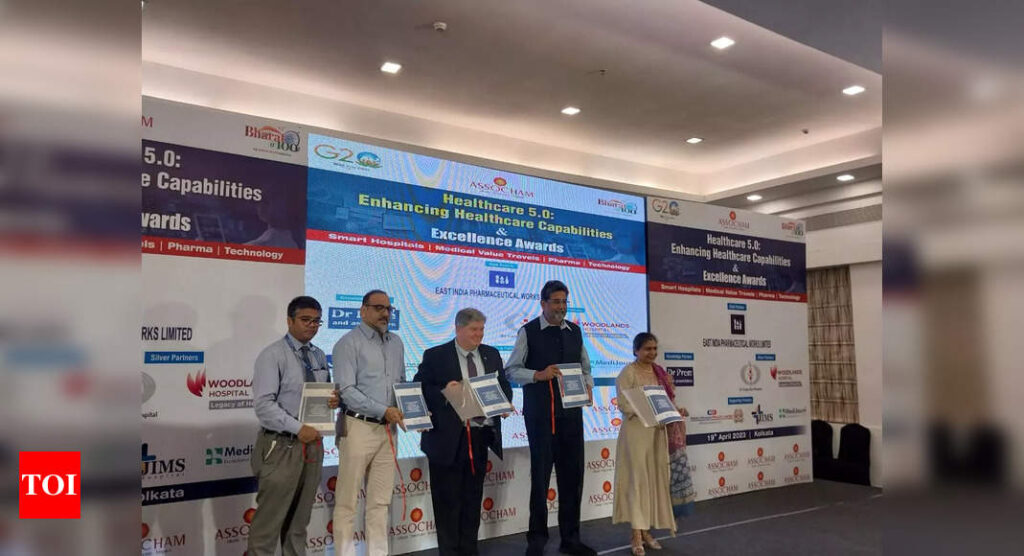Kolkata: Healthcare professionals, researchers, policymakers, healthcare solution providers, and other stakeholders in the healthcare industry stressed upon the policy interventions and speedy implementation of infrastructure for smart hospitals. Future healthcare system would be completely dependent upon technology and algorithms.
Today, technology is being used to create efficient and effective hospitals that offer human-centric experiences. From just being digital to being Smart, hospitals are working to optimize, redesign and build new clinical processes, management systems, digitized networking infrastructure to provide a valuable service to achieve better patient care, experience, and operational efficiency.
The Associated Chamber of Commerce & Industry of India (ASSOCHAM), on Wednesday touched down on these points by hosting Healthcare 5.0 Enhancing Healthcare Capabilities, a national conclave focused on enhancing healthcare capabilities by promoting technology and pharmacy.
Peter Cook, Deputy High Commissioner said, “Bengal needs to champion the health care so that the UK and Bengal can collaborate and bring new innovations and a successful healthcare system. The UK and India have agreed to put healthcare as a focal point. UK is the driving force of health-tech. We need to liberate our system and think differently. We need to look for innovation and collaboration between India and the UK in particular.”
Perminder Jeet Kaur, Senior Director, ASSOCHAM, said, “Two things which are much visible are – technology in patient care delivery. With AI and blockchain as key trends the sector is bound to grow at exponential rate. Second, Globalization has brought the world together and with increased infrastructure and reduced travel cost, global patient mobility is setting new records.”
“Medical value tourism requires certain reforms such as nursing accreditation and nursing availability which is lacking in the industry. The parameters set by the governments may need reconsideration to provide the necessary care,” said Harshvardhan Neotia, Chairman, Ambuja Neotia Group.
ASSOCHAM eastern region chairman Debashri Duttagupta said that India supplies 50% of the global demand for various vaccines, 40% of the generic demand in the US and 25% of all medicines in the UK.
“Having shared these statistics let me state that one key element for sectoral growth is innovation. As an Industry, as a country, there is a dire need for us to embrace innovation. And at ASSOCHAM, we would request the state government to give push to developing centers of excellence,” Duttagupta added.
Dr Ajay Swaroop, Chairman, Sir Gangaram Hospital said, “There is a need for building resilient healthcare systems. This can be achieved by looking at the ways and means for expanding technological infrastructure, developing appropriate legal and e-health policies, standardization, and synchronization of protocols, improving stakeholders’ engagement and involvement and establishment of private and public partnerships and investments.”
Dr Rupali Basu, MD & CEO, Woodlands Multispeciality Hospital Ltd. was also present to address the gathering where participants from Delhi, Gujarat, Karnataka, West Bengal and Bangladesh discussed on the future of healthcare in India. ASSOCHAM also released a study report on “Exploring India’s growth & Excellence in Global Medical Tourism and Wellness Market” in partnership with Dr. Prem & Associates.
Today, technology is being used to create efficient and effective hospitals that offer human-centric experiences. From just being digital to being Smart, hospitals are working to optimize, redesign and build new clinical processes, management systems, digitized networking infrastructure to provide a valuable service to achieve better patient care, experience, and operational efficiency.
The Associated Chamber of Commerce & Industry of India (ASSOCHAM), on Wednesday touched down on these points by hosting Healthcare 5.0 Enhancing Healthcare Capabilities, a national conclave focused on enhancing healthcare capabilities by promoting technology and pharmacy.
Peter Cook, Deputy High Commissioner said, “Bengal needs to champion the health care so that the UK and Bengal can collaborate and bring new innovations and a successful healthcare system. The UK and India have agreed to put healthcare as a focal point. UK is the driving force of health-tech. We need to liberate our system and think differently. We need to look for innovation and collaboration between India and the UK in particular.”
Perminder Jeet Kaur, Senior Director, ASSOCHAM, said, “Two things which are much visible are – technology in patient care delivery. With AI and blockchain as key trends the sector is bound to grow at exponential rate. Second, Globalization has brought the world together and with increased infrastructure and reduced travel cost, global patient mobility is setting new records.”
“Medical value tourism requires certain reforms such as nursing accreditation and nursing availability which is lacking in the industry. The parameters set by the governments may need reconsideration to provide the necessary care,” said Harshvardhan Neotia, Chairman, Ambuja Neotia Group.
ASSOCHAM eastern region chairman Debashri Duttagupta said that India supplies 50% of the global demand for various vaccines, 40% of the generic demand in the US and 25% of all medicines in the UK.
“Having shared these statistics let me state that one key element for sectoral growth is innovation. As an Industry, as a country, there is a dire need for us to embrace innovation. And at ASSOCHAM, we would request the state government to give push to developing centers of excellence,” Duttagupta added.
Dr Ajay Swaroop, Chairman, Sir Gangaram Hospital said, “There is a need for building resilient healthcare systems. This can be achieved by looking at the ways and means for expanding technological infrastructure, developing appropriate legal and e-health policies, standardization, and synchronization of protocols, improving stakeholders’ engagement and involvement and establishment of private and public partnerships and investments.”
Dr Rupali Basu, MD & CEO, Woodlands Multispeciality Hospital Ltd. was also present to address the gathering where participants from Delhi, Gujarat, Karnataka, West Bengal and Bangladesh discussed on the future of healthcare in India. ASSOCHAM also released a study report on “Exploring India’s growth & Excellence in Global Medical Tourism and Wellness Market” in partnership with Dr. Prem & Associates.

